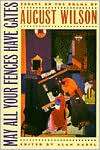

 |

|

The average rating for May All Your Fences Have Gates: Essays on the Drama of August Wilson based on 2 reviews is 4.5 stars.
Review # 1 was written on 2019-05-22 00:00:00 Gail Gordon Gail GordonA tough slog. Made some interesting points, but definitely not a "fun" read. |
Review # 2 was written on 2017-01-10 00:00:00 Joe Fruc Joe FrucIn this quotable and ultimately self-contradictory book, the author seeks to engage in a task that is simultaneously constrained and universal. He seeks to discuss a dozen overlapping approaches to colonized territory within the writings of colonial and post-colonial writers, mostly, but not exclusively Western in origin (Naipul being a notable exception), but seeks to restrict the literature under analysis to nonfictional writing in journalism, travelogues, and administrative reports, and the like. The author seeks to participate in the ironic task of putting the writing of mostly dead white men, along with the occasional woman, under the leering gaze of someone who wishes to make others uncomfortable. That said, the task is so transparently hypocritical that the book ends up, at least if the reader is familiar with the political double standards of anti-colonialist literary analysis, serving as a humorous example of the sort of discourses it labels as lacking legitimacy and authenticity. In terms of its contents, the author begins by defending the scope of his works, and then spends about 200 pages discussing twelve mostly paired approaches that colonialist and post-colonialist nonfictional writings have taken towards the non-Western world, defined here as Latin America, Africa, Asia, and Oceania, including the Middle East, which comes in for frequent commentary. The twelve approaches the author discusses are: surveillance, appropriation, aestheticization, classification, debasement, negation, affirmation, idealization, insubstantialization, naturalization, eroticization, and resistance. The upshot of the author's critical political analysis of the nonfiction texts is that any attempt by a Westerner to understand, classify, categorize, or contextualize what they see in another culture is automatically viewed as a colonial discourse and viewed as a subject of ridicule. Whether one is Kipling or Marx, Rousseau or Levi-Strauss, all are tarred with the same brush as being part of the imperialistic discourse of the West. The upside of this massive and hypocritical lumping together of the entirety of Western commenters of local conditions, journalists, travel writers [1], and the like, which serves as one of many binary oppositions that the author considers to be typical of Western discourse, is that what the author intends to label as pejorative definitions can instead be seen as approaches and strategies to consciously adopt to make the alien seem less alien, whether that means affirming our own identity in the face of threats to that identity, classifying and categorizing what is seen to map the world and the people and situations in it for our own understanding, or appropriating that which we find of most worth in the cultures we see [2], or putting everything around us under surveillance so that we may better understand it. Since the author himself seems to have a vain hope of salvation from Western binary oppositions in the worldviews of the West, a hope that itself serves as an example of decadent idealization, those who read this book wisely can be instructed in the approaches of imperial discourse, and the feeling that one is participating in a noble line of such discourse no matter which aspects of Western civilization one finds most appealing. The best way of dealing with cultural police like this author and others of his ilk is to do the police in different voices, and to consciously adopt strategies to make the world more comprehensible and less broken, contrary to the fractured mindset of this deeply double-minded author. [1] See, for example: [2] See, for example: |
CAN'T FIND WHAT YOU'RE LOOKING FOR? CLICK HERE!!!